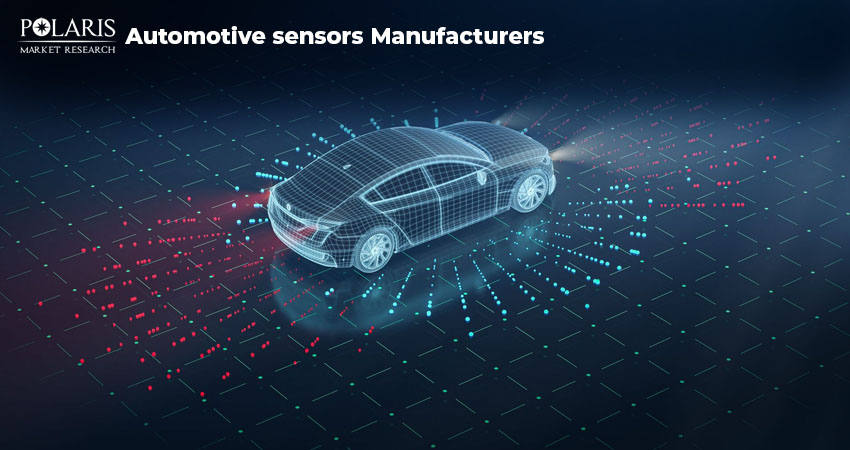Behind the Wheel: Role of Sensors in Modern Automobiles
Who in the world doesn't want a car that senses the needs of the driver or passenger and makes changes accordingly? In recent times, a lot of such features are available in smart cars or e-cars, where air condition starts when there's an increase in temperature, wiper starts to move as soon as raindrops start falling on the windshield, anti-theft security alarms when someone tries to break in the car forcibly.
Ever wondered how all of these features operate on their own without assistance from someone? All of these magical things are nothing but actions of a jewel of modern technology known as automotive sensors. Let's delve down into the world of these automotive sensors, explore their types, and find out recent developments that are happening in their market.

What are Automotive Sensors?
Automotive sensors are a type of sensors that measure and detect changes in a vehicle's environment, converting physical signals into electrical signals for control systems. They monitor safety features, engine performance and efficiency of vehicles.
These sensors provide insights into numerous vehicle parameters to the Electronic Control Unit (ECU) in order to enhance safety, efficiency, and performance. They are essential to the smooth operation of modern automobiles.
Rise of Automotive Sensors:
The automotive industry has had one of the craziest demands in the use of sensors in recent years as vehicles are constantly becoming more autonomous and luxurious. These automotive sensors are used in a variety of car functions consisting of:
- Safety System: Safety is fundamental in automobile design. Various type of safety systems in the car involves the use of automotive sensors such as airbag deployment, warning sound or alarm when not wearing a seatbelt, anti-theft alarms, traction control systems, etc.
- Engine Performance: The engine management system's core components are these sensors, as they enable peak performance, fuel economy, and emission control.
- Driver Assistance System: As a result of technological advancements, there are many features where automotive sensors play an important role in cars to support and enhance the driving experience, such as cruise control, lane-keeping assistance, and parking assistance.
Types of Automotive Sensors:
- Ultrasonic Sensors: These types of sensors produce ultrasonic waves when triggered and are mostly employed in parking assistance for obstacle detection, just like a small SONAR system.
- Pressure Sensors: These sensors recognize and calculate the pressure levels of a car's different fluids, consisting of air, fuel, oil, coolant, etc. They confirm that pressure remains within the determined limits for better functioning.
- Temperature Sensors: They are integral mainly to the engine’s care by monitoring the engine's coolant, oil, and air temperatures. By use of these sensors prolonged life of the engine is maintained by making sure that it runs within a standard temperature range.
- Speed Sensors: These sensors detect the rotational speed of axes and wheels and are majorly used in anti-lock braking systems and transmission control units. They help in preventing wheel lock-up while braking.
- Level Sensors: These sensors check the level of fluid in many reservoirs such as braking fluid reservoir, engine oil reservoir, and radiator coolant reservoir.
Growth and Key Players in the Automotive Sensors Industry
Well, as many can expect, the market of automotive sensors was valued at USD 29.47 billion in 2023 and is projected to grow at a CAGR of 6.2% during the forecast period of 2024–2032. The automotive sensor manufacturers are dominated by globally established players such as:
- Panasonic Corporation: Panasonic Corporation is a Japanese multinational electronics company with headquarters in Osaka, Japan. It was established in 1918. Panasonic is a leading supplier of special sensors, offering a wide array of sensor types, such as pressure, temperature, and infrared array sensors.
- Robert Bosch GmbH: This company was founded in 1886 (Gerlingen, Germany). It is a German multinational engineering and technology company which is commonly known for sensors and semiconductors required in making of these sensors.
- Continental AG: Founded in the year 1871, Continental AG is headquartered in Hanover, Germany. It's a multinational automotive parts company focusing on manufacturing tires, brake systems, electronics in interiors, automotive safety, and components of chassis, and other parts for the automotive industry.
- Infineon Technologies: This company is headquartered in Neubiberg, Germany, and was founded in 1999. Infineon has subsidiaries in the US in Milpitas, California, and in Asia Pacific, Singapore and Japan. It markets semiconductors and systems for the automotive industry.
- MELEXIS: Headquartered in Ypres, Belgium, MELEXIS is a Belgian microelectronics manufacturer of integrated sensor ICs and mixed-signal ICs. Most of these ICs are used in the automotive industry.
These companies are investing heavily in research and development departments in order to manage the supply chain and make automotive sensors more advanced and reliable.
What are the Latest Trends in the Automotive Sensor Industry?
The high demand for automotive sensors across the globe is due to technological advancements and the latest innovative approaches by manufacturers. Some of the main areas under focus are:
- Miniaturization: The more recent sensors in the market are getting smaller and more compact. Hence making it easier to integrate comfortably into vehicles.
- Wireless Sensors: Wireless sensors are gaining more and more demand in recent days due to easier modes of installation. It makes the installation process hassle-free of wiring complications for manufacturing and makes it more reliable.
- Involvement of AI: AI is getting involved more and more in the automotive industry and helping with features such as Autopilot mode; by using the data from sensors, it is also able to predict the behavior of drivers.
- Multiple Fusion Sensors: The data from multiple sensors is compiled and used in order to improve the reliability and accuracy of sensors.
- Biometric Sensors: Biometric sensors are being favored by more and more companies as they tend to measure the data regarding breathing rate, heart rate, body temperature, etc., and determine the fatigue level of the driver. These sensors are gaining popularity in longer-running automobiles such as trucks and containers.
Conclusion
In conclusion, it can be said that automotive sensors are becoming an essential component of modern vehicles, enabling a wide range of safety, comfort, and performance features. As technological advancement goes on, the need for more sophisticated and advanced sensors continues to rise. The leading manufacturers are at the forefront of this trend, leading to the world of innovation and shaping the future of automotive sensors industries.


